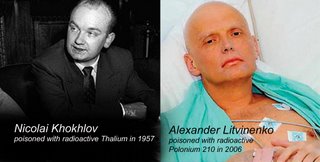
Two ex-KGB agents poisoned -
but is Russia's secret service to blame?
Police are searching “a number of locations” as they search for traces of radioactive substances following the death of ex-KGB spy Alexander Litvinenko. One area believed to be under scrutiny is a property in Muswell Hill in north London, the home of the former spy. The Home Office have said in a brief statement that a radioactive substance was probably involved in the poisoning of the former Russian spy and the BBC has reported that COBRA met late last night. Professor Alan Perkins, a medical expert, told Sky News he thought the Home Office statement was “puzzling”. He also said he was surprised the hospital was unable to identify the presence of a radioactive substance in Mr Litvinenko.
Mr Vladimir Putin, speaking in Helsinki, said, “I extend my condolences, and as I understand this was not a violent death…and I hope that British authorities would not perpetuate rumours of political involvement”. There have been repeated denials of Russian involvement in Mr Litvinenko’s death and a spokesperson for Mr Putin had had already described the death as “tragic”.
But whilst the Kremlin continue denials of any involvement a family member pointed the finger firmly at the Putin government. Outside the hospital a family member said in a statement, “You have shown yourself to be as ruthless as your critics have claimed.”
Orgev Gordievsky said the use of a radioactive substance had all the hallmarks of a KGB assassination. He told the BBC, “This was an execution by a foreign power.” Mr Livinenko had certainly made enemies within the FSB, formerly the KGB. After his defection from Russia he continued to make allegations about the FSB. As well as accusations of having orchestrated the bombing of apartment bombings in Moscow and Volbodosk, which killed 300 people in 1999, he had claimed that Ayman Al Zawahiri, al-Qaeda’s no 2, had been a former KGB agent. He also alleged that he had been sent to London to dispatch a businessman Mr Berezovsky. The Guardian in an article published in January 2004 alleged that Litvinenko had been recruited by the British secret service [Kafkas.org / Chechen Times]. The Russian secret service has been involved in the death of former spies before and it will be difficult for the Russian authorities to shift the focus of blame from themselves. In the 1950s Georgi Okolovich was a prominent dissident Russian emigre. He was an official in the Popular Labor Alliance of Russian Solidarists, an anti-Soviet group based in West Germany. The KGB marked him for death. In 1954, Soviet assassin Nicolai Khokhlov was sent to West Germany to kill him. But the plot hit an unusual snag: before accomplishing his mission, the assassin converted to Christianity and rejected his murderous profession. Upon his arrival in West Germany he defected and warned Okolovich about the plots against him.
By saving Okolovich's life, however, Khokhlov became a marked man himself: in 1957 the KGB poisoned him with radioactive thallium. Hospitalized and given massive blood transfusions and a variety of antitoxins, he survived [CNN].
The apparent similarities will only serve to reinforce the opinions of those who believe the Russian secret service had a hand in the death of Alexander Litvinenko.
At 15:00 the Health Protection Agency held a press briefing at Westminster. Pat Troop described the use of a radioactive substance to poison an individual in the UK as unprecedented. Professor Roger Cox said that at 18:00 yesterday the HPA was informed that a large quantity of alpha radiation had been detected in Mr Litvinenko’s urine. Throughout the press conference there was no explanation as to why this had not been previously detected throughout Mr Litvinenko’s stay in hospital. He said that the substance concerned was Polonium 210.
He said that there would be no risk to those in contact with Mr Litvinenko and there was a continuing assessment being made of what risk there might be to the general public. In summary, the professor said the substance had to have been ingested, inhaled or through a wound. The two experts were unable to provide any specific figures both in regards levels of radiation detected, nor of any amounts of Polonium 210 detected. And in the Latest developments the BBC has learned that the Metropolitan Polic have discovered traces of radioactivity at the Itsu sushi bar where Litvinenko had eaten in early November [BBC].
No comments:
Post a Comment
Due to increased amount of spamming, comments may no longer be left. Despite requesting that comments be relevant to the article and informing readers that spam, advertising and comments containing links WOULD NOT BE POSTED, spammers still attempted to post such content. Apologies, but the spammers, trolls and bots have spoilt the party for everyone.
Note: only a member of this blog may post a comment.